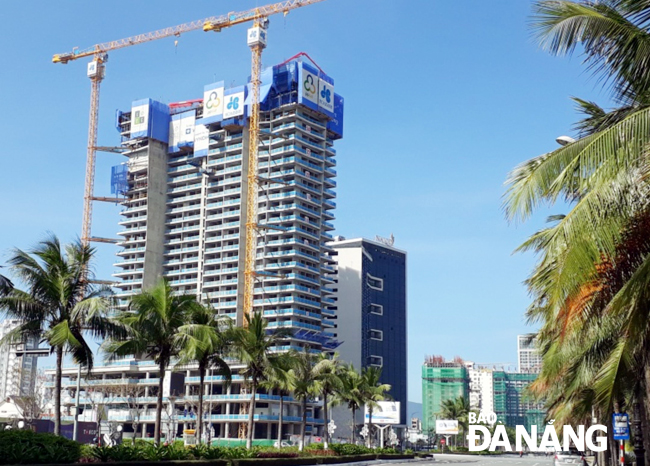Potential risks of purchasing condotel units
Recent years have seen a boom in the number of condotels (also known as condo hotels) in such coastal tourist destinations as Da Nang, Nha Trang and Phu Quoc. With a growing number of real estate developers rushing to build new condotels, domestic experts are now raising their concern over potential risks of this new style of property development.
 |
| Many condotels are under construction in the city (Photo: Trieu Tung) |
Condotel, also known as a hotel-condo or a contel, is a building which is legally a condominium but is operated as a hotel that offers short term rentals, and maintains a Front Desk.
Condotel project developers often use funds for their projects from a sale-leaseback transaction with their offered-property owners. The owners buy a fully serviced condominium as a vacation home, but then offer it for short-term rentals on a hotel-type basis.
Since appearing in the Vietnamese market, this real estate model has become the latest craze in the domestic real estate market because of its highly competitive advantages and its attractive profits.
It was reported at recent national seminar in Da Nang, over the 2018 – 2019 period, an average of about 20,000 condo units of either under or above 45 m2 each, are expected to go on sale per year.
In his remarks at the seminar, Mr Dang Viet Dung, the Head of the Da Nang Department of Publicity and Training, cum Vice Chairman of the Viet Nam Construction Association, underlined the significance of finding feasible solutions to some issues of deep concern arising from the development and management of condotels.
A domestic real estate expert noted that many property developers would now like to restructure their initial hotel projects into condotels, as they can recoup their investment much quicker by selling units to individual investors.
Those buying into condotel projects are usually promised a dividend of between 8% and 12% per year on the total profit of the building for their investment.
Such a dividend is also more affordable than what are considered exorbitant bank loan interest rates that developers would otherwise have to pay if they ran the hotels on their own.
The condotel model also allows developers to share the management and business risks with investors who purchase the condo units.
 |
| Former Deputy Minister for Construction Pham Si Liem proposed that the Construction Ministry issue a contract template for the sales of condo units |
According to insiders, despite optimism around the growth of tourism that the condotel proliferation suggests, buyers of condo units, or subinvestors, are being placed at high risk because they stand on shaky legal ground. In detail, subinvestors might face the possible loss of property ownership, the failing returns, and other issues.
Now, Viet Nam does not have comprehensive regulations regarding ownership rights and management for this form of property. Documents that confirm the ownership rights have yet to be issued for condotels.
Some developers have failed to declare the real functions of their units, while others have given misleading information about their ownership to buyers.
Many other developers have also been caught not declaring taxes on rental contracts. Similarly, many condo unit owners also refuse to declare taxes when they lease the property to third parties.
In an attempt to close legal loopholes, former Deputy Minister for Construction Pham Si Liem emphasised a must-do for the Construction Ministry to issue a contract template for the sales of condo units so as to ensure the interests of subinvestors.
Mr Tran Ngoc Hung, the Chairman of the Viet Nam Construction Association, vowed that his unit would urge national state management agencies to develop specific legal framework for this new style of property development.